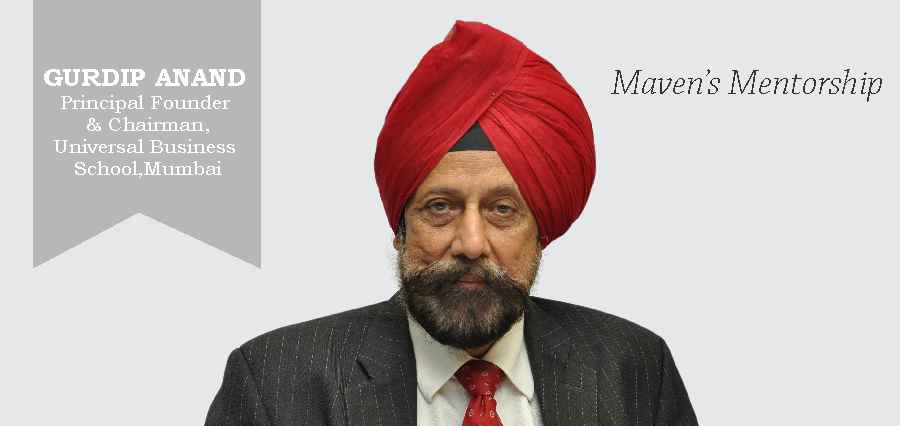It is absolutely certain that the learning and curriculum in our MBA Programs which include Marketing, Finance, Operations, Human Relations and General Management, are of critical value for entrepreneurs. However, the big differences in the tools required, to teach entrepreneurs are as follows:
- Different Learning processes
A potential entrepreneur is hungry to imbibe the learnings, which will make him successful in business. As such whilst teaching entrepreneurs at the post graduate level, we have to accept that it is the student, who has to come prepared to the class, having already read the topic to be covered in the day’s lecture and raise his doubts, before we commence teaching. At the end of the class, he may again seek further clarifications, however, he will often want to re-connect with his Professor, later in the day, as he reads in the Library, some articles on the topic, covered during the day’s lecture. Faculty have to start their lectures, by first asking for questions and should be available after the class, for responding to further questions, which will arise in an entrepreneurs mind, as he tries to digest the complexities, of the topic in question.
Only a third of the teaching hours, should be devoted towards lectures given by the faculty and a third of the time, should be spent in case presentations by the entrepreneurs and the dialogue, which follows thereafter. Further, the remaining one-third is to be spent in seminars and workshops, where the entrepreneurs take the lead, is delivering the conclusions, of the research undertaken by them and fellow students, then debate the issues involved, with them.
- Faculty Coaching ‘Potential Entrepreneurs’ in Business Incubation Centres, should also have a broader orientation about business
This is a major problem in India, since 60 % of the Faculty in B-Schools in our country have ‘ZERO’ experience, in having done business and they have never worked at ‘Top Management’ levels, in corporate organizations. Only when a professional has worked at top management levels, does he get a clear ‘Perspective View’ of how different Functions connect or conflict, in their approaches and how these issues are resolved, at a CEO level and why some Business plans and strategies produce the promised results, and why the others, cut a sorry figure.
It is true that 20% of Faculty in B-Schools in India, have 10-15 years professional management experience, but the awkward secret does emerge, soonest one discovers, that they are in fact ‘REFFUGES’ from the corporate world, having quit at Junior / Middle levels, since they found the going too tough, in today’s very competitive market place. They do not have the intellectual horsepower, to teach entrepreneurs.
As such the tools required to teach entrepreneurs are available only with at best 20% of the Faculty, in Indian B-Schools, who have spent at least 10 years in top management positions.
- Additional Learning Inputs, need to be imparted in Incubation Centres
Entrepreneurs need to be taught that 87% of all new start-ups fail and as such they need to have the perseverance, to accept several failures, in their first venture. Each failure, will serve to give them a lot of learning, which will contribute towards later success, in their business. As such the projects assigned to Entrepreneurs, should have a very high ‘Slog Quotient’, which prepares them for the tough life they will face, when they launch their business ventures. Workshops and simulated exercises including dynamic case studies get the entrepreneurial spirit alive as they create environments of learning making the entrepreneurs more flexible and agile to react to the demands of the marketplace.
Entrepreneurs also need to be taught in great detail how business partnerships break-up sometimes in the 1st generation, but more often in the 2nd generation, due to sibling rivalries. Finally, Entrepreneurs need to be taught that there should always be a built-in ‘Exit Clauses’, in all Partnership Agreements. Entrepreneurs need to be taught, that finally the panacea for these troubles, lies in eventually professionalizing the business, whereby the owners, may not eventually have any serious role, in managing the business.
I would like to add a quote by R. H Cabell:
“I love business because it is competitive, because it rewards deeds rather than words. I love business because it compels earnestness and does not permit me to neglect today’s task while thinking of tomorrow. I love business because it undertakes to please, not reform; because it is honestly selfish, thereby avoiding hypocrisy and sentimentality. I love business because it promptly penalizes mistakes, selfishness and inefficiency, while rewarding those that give it the best they have in them. Lastly, I love business because each day is a fresh adventure”
Authored by:
Gurdip Anand,
Principal Founder & Chairman,
Universal Business School, Karjat, Mumbai









